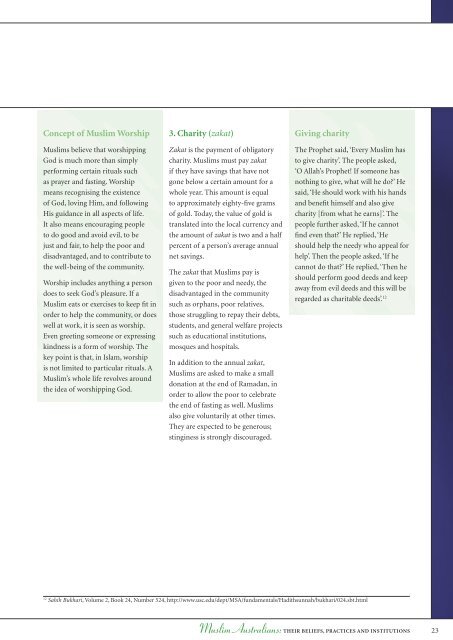Muslim Australians - Religion Cultural Diversity Resource Manual
http://www.islamicglobe.com
http://www.islamicglobe.com
You also want an ePaper? Increase the reach of your titles
YUMPU automatically turns print PDFs into web optimized ePapers that Google loves.
Concept of <strong>Muslim</strong> Worship<br />
<strong>Muslim</strong>s believe that worshipping<br />
God is much more than simply<br />
performing certain rituals such<br />
as prayer and fasting. Worship<br />
means recognising the existence<br />
of God, loving Him, and following<br />
His guidance in all aspects of life.<br />
It also means encouraging people<br />
to do good and avoid evil, to be<br />
just and fair, to help the poor and<br />
disadvantaged, and to contribute to<br />
the well-being of the community.<br />
Worship includes anything a person<br />
does to seek God’s pleasure. If a<br />
<strong>Muslim</strong> eats or exercises to keep fit in<br />
order to help the community, or does<br />
well at work, it is seen as worship.<br />
Even greeting someone or expressing<br />
kindness is a form of worship. The<br />
key point is that, in Islam, worship<br />
is not limited to particular rituals. A<br />
<strong>Muslim</strong>’s whole life revolves around<br />
the idea of worshipping God.<br />
3. Charity (zakat)<br />
Zakat is the payment of obligatory<br />
charity. <strong>Muslim</strong>s must pay zakat<br />
if they have savings that have not<br />
gone below a certain amount for a<br />
whole year. This amount is equal<br />
to approximately eighty-five grams<br />
of gold. Today, the value of gold is<br />
translated into the local currency and<br />
the amount of zakat is two and a half<br />
percent of a person’s average annual<br />
net savings.<br />
The zakat that <strong>Muslim</strong>s pay is<br />
given to the poor and needy, the<br />
disadvantaged in the community<br />
such as orphans, poor relatives,<br />
those struggling to repay their debts,<br />
students, and general welfare projects<br />
such as educational institutions,<br />
mosques and hospitals.<br />
In addition to the annual zakat,<br />
<strong>Muslim</strong>s are asked to make a small<br />
donation at the end of Ramadan, in<br />
order to allow the poor to celebrate<br />
the end of fasting as well. <strong>Muslim</strong>s<br />
also give voluntarily at other times.<br />
They are expected to be generous;<br />
stinginess is strongly discouraged.<br />
Giving charity<br />
The Prophet said, ‘Every <strong>Muslim</strong> has<br />
to give charity’. The people asked,<br />
‘O Allah’s Prophet! If someone has<br />
nothing to give, what will he do?’ He<br />
said, ‘He should work with his hands<br />
and benefit himself and also give<br />
charity [from what he earns]’. The<br />
people further asked, ‘If he cannot<br />
find even that?’ He replied, ‘He<br />
should help the needy who appeal for<br />
help’. Then the people asked, ‘If he<br />
cannot do that?’ He replied, ‘Then he<br />
should perform good deeds and keep<br />
away from evil deeds and this will be<br />
regarded as charitable deeds’. 12<br />
12<br />
Sahih Bukhari, Volume 2, Book 24, Number 524, http://www.usc.edu/dept/MSA/fundamentals/Hadithsunnah/bukhari/024.sbt.html<br />
<strong>Muslim</strong> <strong>Australians</strong>:THEIR BELIEFS, PRACTICES AND INSTITUTIONS 23














